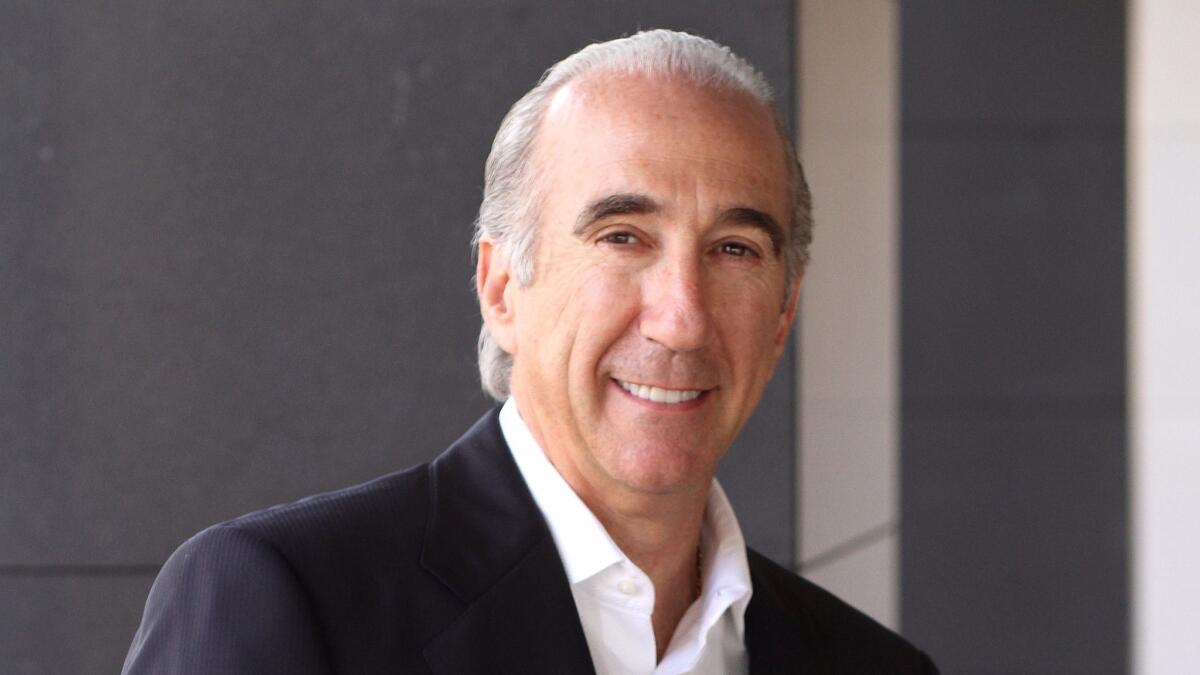MGM board ousts Gary Barber as CEO amid disagreement over the studio’s future

- Share via
The sudden ouster of Gary Barber as chief executive of Metro-Goldwyn-Mayer, who helped rebuild the once iconic studio, took the entertainment industry by surprise when the management change was announced late Monday night.
MGM Holdings’ board of directors said that Barber would be replaced after eight years as chief executive of Metro-Goldwyn-Mayer and that it had launched a search for his replacement. In the meantime, a group of division heads and senior executives will carry out MGM’s “strategic initiatives,” the Beverly Hills-based company said in a statement.
No reason was given for the move, which comes just five months after Barber’s contract was extended through 2022. But people close to the company said Barber’s ouster was triggered by a disagreement with the board over the future strategic direction of the company.
There has been widespread speculation that the small studio, under Barber, was positioning itself to be acquired by a larger player as legacy media companies look to bulk up, and tech giants such as Apple, Amazon and Google are ramping up their Hollywood investments.
But the board, led by Chairman Kevin Ulrich, wanted to keep building the business without selling, people close to the studio said. Barber had a reputation as a savvy businessman, but the board wanted a new leader who would accelerate the studio’s growth in an increasingly challenged entertainment business. Ulrich is CEO of investment firm Anchorage Capital Group, which is one of MGM’s major shareholders.
The company declined to comment beyond its brief announcement issued Monday, saying the leadership change would help usher in a new phase of growth.
“Over the past eight years, MGM has successfully built a world-class company and talented team,” Ulrich said in a statement. “With this transformation complete, MGM is uniquely positioned for exceptional future growth in the evolving entertainment landscape. Now is the right time to enable the next generation of leadership who can help drive the creativity, collaboration and partnership needed to continue the company’s positive trajectory.”
Barber joined MGM in December 2010 after the company’s emergence from Chapter 11 bankruptcy protection.
Since then, Barber has led the effort to revive the studio, which has enjoyed a recent resurgence in the television business with hit shows such as FX’s “Fargo.” MGM also produced Hulu’s acclaimed series “The Handmaid’s Tale,” which last year became the first streaming show to win the Emmy for best drama. “Shark Tank” producer Mark Burnett has run the company’s television division since 2016, after MGM bought full control of his joint venture with the studio, United Artists Media Group.
Under Barber’s leadership, the company has grown rapidly through acquisition. Last year, MGM acquired full ownership of cable movie network Epix for $1.2 billion. It also announced the relaunch of Orion Pictures as a theatrical film distributor. This year, MGM began distributing its own movies theatrically for the first time since its bankruptcy, with the release of the remake “Death Wish” with Bruce Willis.
In film, the company is best known as the producer of the James Bond franchise. The 25th film in the series is expected to arrive in theaters in 2019. Sony Pictures has released the recent 007 movies for MGM.
Other than the reliable Bond series, MGM’s film division has produced multiple remakes and reboots of old film franchises, with mixed results. “Ben-Hur” was a costly flop in 2016, and “Tomb Raider” posted a middling box-office debut last weekend in the U.S. and Canada.
MGM posted profit of $305 million in the first nine months of its fiscal 2017, triple its net income from the same period a year earlier, according to financial statements. Revenue was $856 million, down 3% year-over-year. The company reports forth-quarter earnings March 28.
Twitter: @rfaughnder
UPDATES:
5:05 p.m.: This article has been updated with additional information about Gary Barber’s ouster from MGM.
This article was originally published March 19.
More to Read
Inside the business of entertainment
The Wide Shot brings you news, analysis and insights on everything from streaming wars to production — and what it all means for the future.
You may occasionally receive promotional content from the Los Angeles Times.











